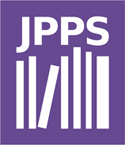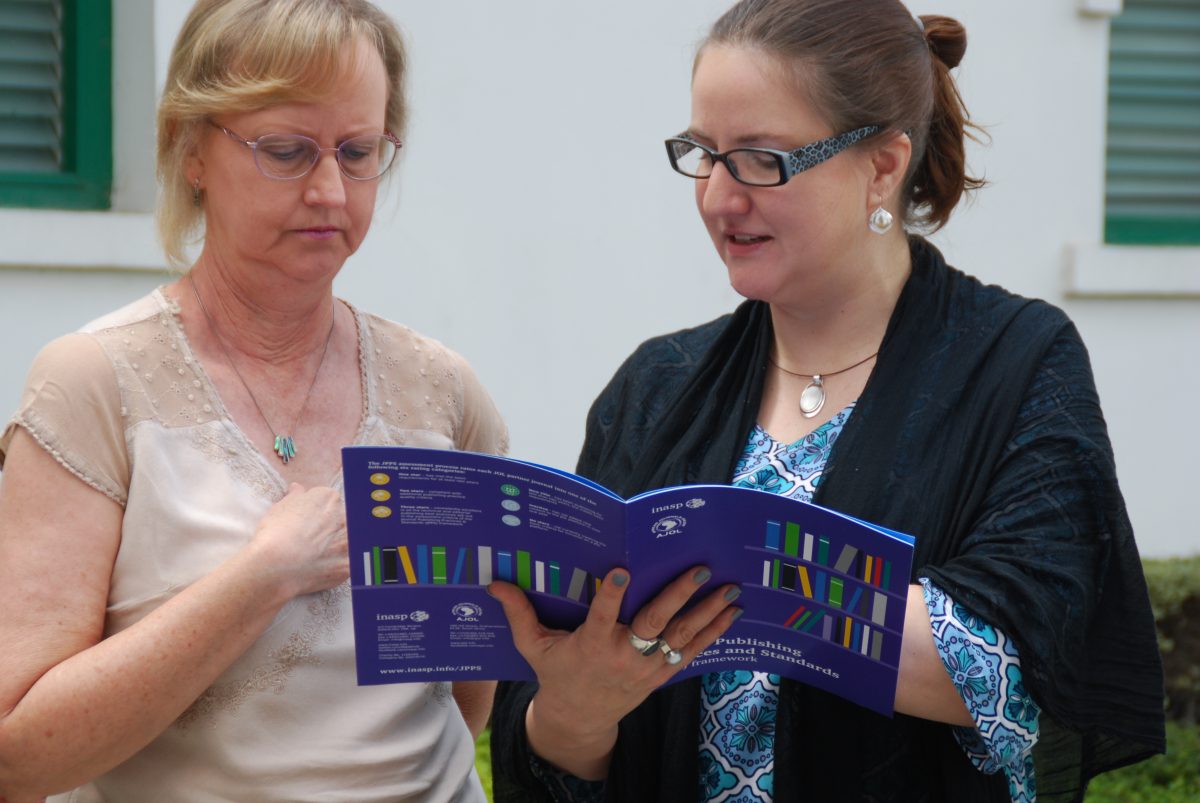Today, INASP and African Journals Online have launched the Journal Publishing Practices and Standards (JPPS), a unique new framework for providing accreditation and support for journals in the Global South. The JPPS provides detailed and internationally accepted assessment criteria for the quality of publishing practices and policies of Southern journals.
In this interview, Susan Murray (right), Executive Director of African Journals Online (AJOL), and Sioux Cumming (left), Programme Manager, Journals Online, share the origins and potential of JPPS.
How did JPPS come about?
Susan: The JPPS framework originated with my musing over many years about how AJOL could both showcase journals that are attaining excellence in terms of publishing practices according to global norms and standards and be inclusive of those that are learning and need some improvement. So, basically that’s what the framework is. It’s a teaching tool for those journals that have been assessed and are needing to learn about the areas on which they still need to work, and to transparently show those aspects of the journals to readers and to authors. At the same time it is helping establish the prestige and reputation of the journals that are already implementing best practices in scholarly publishing in developing countries.
Sioux: In the last few months we’ve started to correspond with the editors about the assessment results, and the feedback that we’ve had has been really really positive.
What challenges face journals from the global south?
Susan: In the developed world, the norm is for journals to be published by really large professional commercial publishing houses. In developing countries it is more the norm for journals to be published as stand-alone titles by universities or scholarly research associations – usually run by editorial boards who are doing this work on a purely voluntary basis after hours. They are subject experts, not publishing experts, so they are not necessary aware of all the standards – particularly the newer, technical, standards – that are required for reputable journal publishing.
How will JPPS help editors?
Susan: JPPS will help editors in terms of clarity about the standards, processes and practices that they need to have in place to be considered as strong reputable journals in the international research arena. It’s also a means of practically helping editors to implement those standards, processes and practices – detailed reports for editors are generated by the framework assessment process.
Sioux: Last week we were in Nepal, talking to 30 Nepalese journal editors, and we had an amazing response as we shared the framework. There is a real thirst among journal editors to know what they can do to meet an international standard. To me, this is very much a learning process; I’m not so concerned with what the initial ranking turns out to be but more with what we can do to help editors improve that ranking.
And for readers and researchers, what is the value of the framework?
Susan: The transparency of the best practice publishing standards and processes is going to be shown for each journal and each Journals Online (JOL) platform. Readers will get a better idea of the integrity of the practices of the journal and therefore the reliability of the research contained in them. Also, it will help authors in choosing journals to which they can submit their articles knowing that their work will be published in a dissemination platform that is ensuring good standards of peer-review processes and publishing assessment.
What’s next for the JPPS?
Susan: At the moment, all of the journals on all of the JOL platforms in developing countries around the world are being assessed by an independent publishing consultant expert. Once that is completed, the JPPS badges will be displayed on all of the JOL websites.
JPPS is officially launching with Sioux’s presentation at the COASP conference this week. Then, next month, I’m going to be presenting it in more detail at the STM conference in Frankfurt.
Sioux: Once JPPS is launched, the next step will be working out the process for ongoing assessment. We are also exploring whether to roll the framework out to other aggregators in the South, who are facing the same problems that we are in terms of the view of Southern journals. We’ve had some interest already from other organizations.
What has struck you throughout this process – have there been any surprises along the way?
Sioux: The three-star classification is very challenging. Any journal that achieves a three-star status is basically on a par with the best international journals in terms of publishing processes. It has been good to see how much the journals we’ve assessed already comply with many of the criteria – they are getting good scores and are achieving a lot.
Susan: JPPS has been an enormous undertaking first of all and a huge amount of work – years of work has gone into putting together the framework. But I think it’s going to be all worthwhile. It will transparently share the degree of repute that Southern journals do have and the practices that they are attaining in terms of making sure that scholarly publishing in developing country journals is of a high standard.


